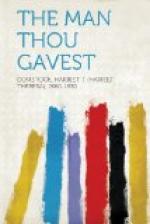McPherson had been listening, and gradually his long strides became less nervous.
“Until to-day, I haven’t wished your uncle back, Truedale, since he went. He was a poor, inarticulate fellow, but I’ve learned to realize that he had a wide vision.”
“Thank you, Dr. McPherson, but I have often wished him back.”
Once outside McPherson’s house, Truedale raised his head and sniffed the clear, winter air with keen enjoyment. A sense of achievement possessed him; the joy of feeling he had solved a knotty problem. He found he could think of Pine Cone—and, yes, of Nella-Rose—without a hurting smart. He was going to do something for her—for her people! He was going to make life easier—happier—for them, so he prayed in his silent, wordless way. He had a new and strange impulse to go to Lynda and tell her that at last he was released from any hold of the past. He was going to do what he could and there was no longer any dragging of the anchors. He wanted her to help him—to work out some questions from the woman’s point of view. So he hurried on and entered the house with a light, boyish step.
Thomas, bent but stately, was laying the table in the cheerful dining room. There were flowers in a deep green bowl, pale golden asters.
Long afterward Truedale recalled everything as if it had been burned in his mind.
“Is Miss Lynda in?” he asked, for they all clung to the titles of the old days.
“Not yet, Mister Con. She went out in a deal of a hurry long about three o’clock. She didn’t say a word—and that’s agin her pleasant fashion—so I took it that she had business that fretted her. She’s been in the workshop all day.” Thomas put the plates in place. They were white china, with delicate gold edges. “Hum! hum! Mister Con, your uncle used to say, when he felt talkative, that Miss Lynda ought to have some one to hold her back when she took to running.”
“I’ll look her up, Thomas!”
Conning went up to the workshop and turned on the electricity. A desolate sensation overcame the exhilaration of the afternoon. Lynda seemed strangely, ominously distant—as if she had gone upon a long, long journey.
There was a dying fire on the hearth and the room was in order except for the wide table upon which still lay the work Lynda had been engaged with before she left the house.
Truedale sat down before it and gradually became absorbed, while not really taking in the meaning of what he saw. He had often studied and appreciated Lynda’s original way of solving her problems. It was not enough for her to place upon paper the designs her trained talent evolved; she always, as she put it, lived in the rooms she conceived. Here were real furniture—diminutive, but perfect, and real hangings—colour and form ideal, and arranged so that they could be shifted in order that light effects might be tested.
It was no wonder Truedale had often remarked that Lynda’s work was so individual and personal—she breathed the breath of life in it before she let it go from her. Truedale had always been thankful that marriage had not taken from Lynda her joy in her profession. He would have hated to know that he interfered with so real and vital a gift.




